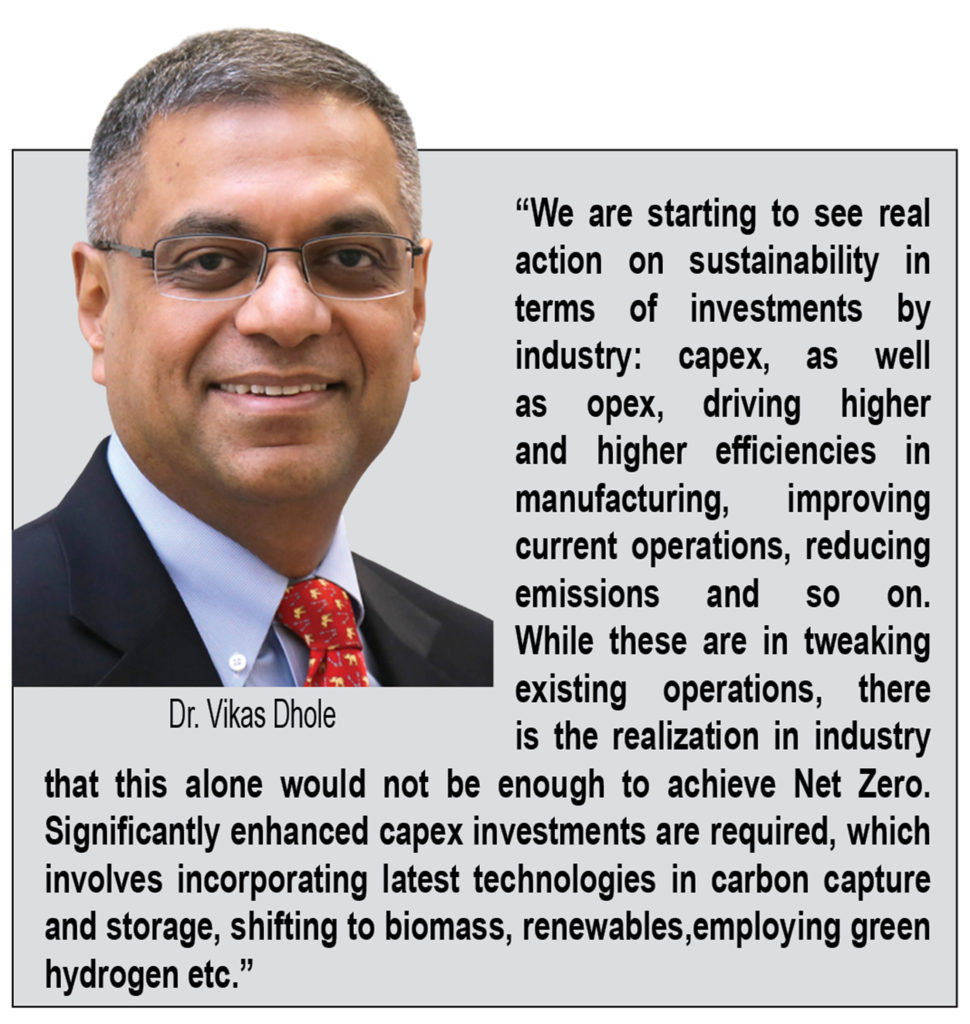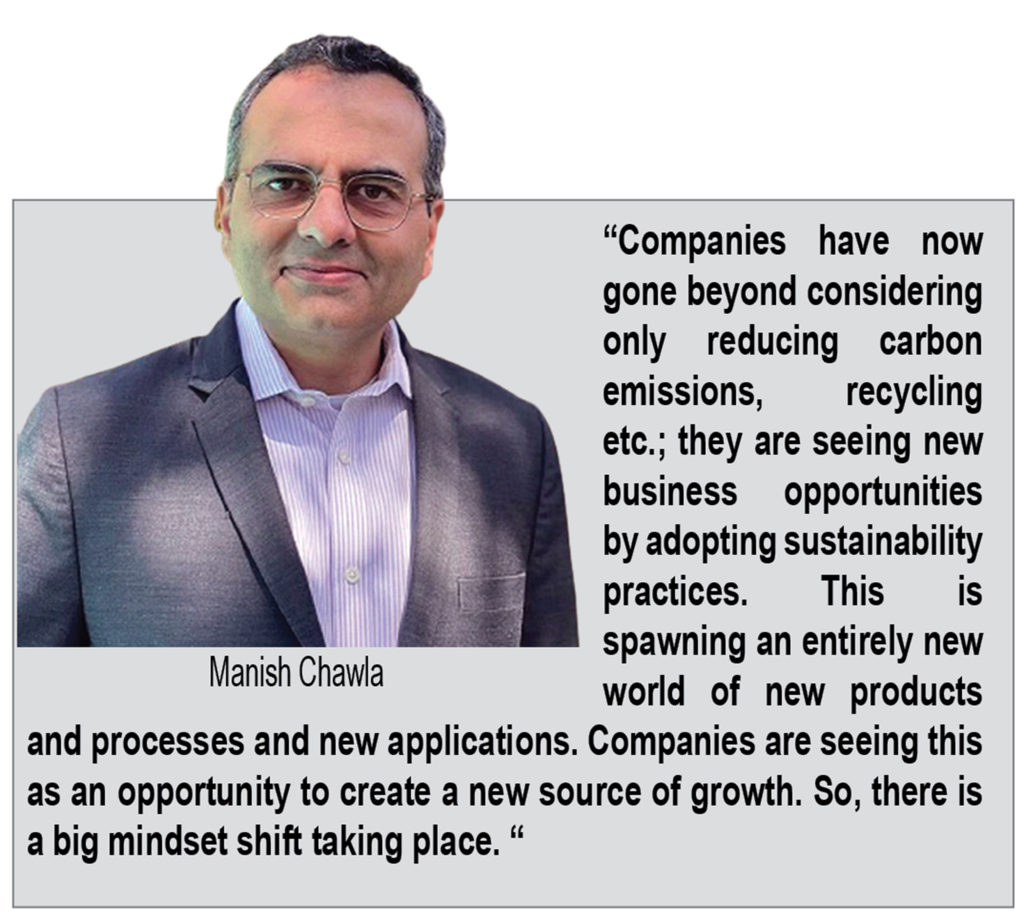The AspenTech team of Dr. Vikas Dhole, along with Manish Chawla, Sr Vice President, Mr Abhinav Chowdhary, Country-Manager – India, were in conversation with Chemical Industry Digest, in Mumbai recently, specifically on sustainability. Aspen Technology (AspenTech) is a leader in asset optimization software providing solutions to optimize asset design, operation and maintenance lifecycle. AspenTech combines decades of process modelling expertise with artificial intelligence.
Excerpts from the discussions are reproduced here.
Sustainability is no more a jargon or a buzzword. Nor is it just to promote brand equity through vision statements of corporates. According to Dr.Vikas Dhole, General Manager Sustainability Industry Business Unit with Aspen Technology Inc, “There is a radical industry change globally, in recent times. We are starting to see real action on sustainability in terms of investments by industry: capex, as well as opex, driving higher and higher efficiencies in manufacturing, improving current operations, reducing emissions and so on. While these are in tweaking existing operations, there is the realization in industry that this alone would not be enough to achieve Net Zero.
 Significantly enhanced capex investments are required, which involves incorporating latest technologies in carbon capture and storage, shifting to biomass, renewables, employing green hydrogen etc. As companies need to work on profitable lines, they are exploring optimum pathways to achieve sustainability”.
Significantly enhanced capex investments are required, which involves incorporating latest technologies in carbon capture and storage, shifting to biomass, renewables, employing green hydrogen etc. As companies need to work on profitable lines, they are exploring optimum pathways to achieve sustainability”.
Manish Chawla, Sr. Vice President, Chief Customer Officer for Aspen Tech, revealed a very interesting and welcome aspect, “Companies have now gone beyond considering only reducing carbon emissions, recycling etc.; they are seeing new business opportunities by adopting sustainability practices. This is spawning an entirely new world of new products and processes and new applications. Companies are seeing this as an opportunity to create a new source of growth. So, there is a big mindset shift taking place. Not only chemical companies, but engineering companies too will benefit from the spate of new projects that are coming up and slated to come up for moving towards sustainability”.
Pointing out to the strong global public awareness and public opinion favouring sustainability, Dr.Dhole stated that these are powerfully influencing company owners and top managers. Stakeholders, which include not only the general public, but one’s customers, the younger generation and even the employees – has become another major driver, as they canform an opinion on a company’s attitude and performance on sustainability. It has reached a stage where if companies are not serious on sustainability, they would be at a great disadvantage,” stated Dr. Dhole.
Multiple Pathways to Sustainability
Digital solutions with the latest developments in Industry 4.0 can help customers accelerate their sustainability journey. Dr. Dhole elaborated on the different sustainability pathways in the march towards Netzero, which companies and countries must choose and strategize on which of the pathways are most suitable and the quickest routes. There are proven solutions that provide returns on investments, he informed.
Companies can easily adopt energy efficiency, emissions management, water conservation and waste reduction. Newer technologies that are already available include biobased feedstocks, use of renewable energy like solar, wind etc., shifting to hydrogen economy as well as carbon capture and storage. Electrification based on renewables is very important for India, but this needs good grid management to integrate with current power generation models. AspenTech, Dr. Dhole said, can help with grid management systems for which they have proven expertise.
At the same time, research and development work on newer areas is also happening, for developing new materials, for plastics recycling and in producing chemicals from carbon dioxide.
Challenges Involved
Replying to our question on the challenges involved in the many pathways to sustainability, Dr. Dhole said that there are challenges all the way and listed the following:
- How to make existing assets more efficient and operations more sustainable with a company’s available resources.
- How renewables-based electricity can be stabilized and integrated with existing power generating and transmission systems or grid management.
- Major challenges are in the emerging technologies such as carbon capture and storage, hydrogen generation through electrolysis using renewable power, and how to make these high capital-intensive technologies less costly.
Chemical Industry Digest also discussed about the challenges in the shift to bio-based feedstocks, which supply sources are disorganized with uncertainty and unreliability in continuous supply, when compared to fossil fuel-based oil and gas, coal etc. where there is reliability in the supply chain.
 Chawla said that with bio-feedstocks the entire supply chain needs drastic overhaul. Companies are completely redefining their supply chains, making radical changes and investments to create reliable supply chain of bio-feedstocks. He said that there are companies in Western Europe who are redefining themselves as agriculture companies.
Chawla said that with bio-feedstocks the entire supply chain needs drastic overhaul. Companies are completely redefining their supply chains, making radical changes and investments to create reliable supply chain of bio-feedstocks. He said that there are companies in Western Europe who are redefining themselves as agriculture companies.
Dr. Dhole added that bio-feedstocks provide a great opportunity for digital technologies to stabilize the bio supply chain, streamline it and integrate it with existing manufacturing operations.
Future of Oil and Gas
How would the shift to renewables in this huge energy transition that is taking place impact the future of oil and gas?
Dr. Dhole said, “I don’t foresee a total shift from oil and gas to renewables and other alternatives in the foreseeable future, since accelerating global economic growth will only increase the demand for fuels and feedstocks. What will happen is that the absolute dependency on fossil fuels will diminish as other sources like renewables, hydrogen, CO2 etc. will become part of the fuel/feedstock mix”.
Digital technologies are important for energy transition, emphasized Dr. Dhole. “In the process industries, we can now model an asset reliably, including all the criteria from design to operation using historical operating data of lifecycles of last fifty years. Tremendous strides have been made in the scientific and engineering areas to make this happen. This knowledge significantly expands the capability of decision-making particularly in scaling complex challenges. AspenTech has developed proven technologies including AI-based solutions”.
On whether Net Zero target can be achieved globally by 2070, Dr. Dhole said, it will depend on how the newer technologies become economically viable. And in this respect,it will be innovation that will drive sustainability. Governments facilitating investments in innovation will greatly spur the movement of sustainability. He spoke of how the US government’s Inflation Reduction Act is making available huge funds for investments in R&D to develop newer technologies. This Act, Chawla said, has sparked lot of interest in Europe and other countries for emulation. Dr. Dhole added that there is greater collaboration globally in many areas in R&D in sustainability including collaborations between academia and industry. Companies are reporting their carbon footprints openly.
Opportunity for India’s Innovation Centres
In India too, we need greater collaboration between industry and academic institutions. This is a huge opportunity for India in innovation, he said as we have enormous scientific and engineering talent proven IT capability and with lot of new startups also coming up. Many innovation centres have also come up in India.
Indian companies, particularly the top tier ones, are in the forefront on digitalisation according to Dr. Dhole. In the SME segment, there is a huge variation in digitalisation and possibly, the biggest opportunity for digitalisation to drive energy efficiency programs, emission reduction etc. SMEs represent a high-growth segment for the company, Chawla.
AspenTech has solutions specifically for SMEs, which can help them leapfrog without going through the long-drawn-out process that larger companies went through earlier.
Many Indian companies have established energy transition business groups in their companies to drive implementation of innovation, development and for incorporation of new technologies in sustainability supported by the traditional groups of engineering, operations, etc.
Digital technologies are important for energy transition, emphasized Dr. Dhole. “In the process industries, we can now model an asset reliably, including all the criteria from design to operation using historical operating data of lifecycles of last fifty years. Tremendous strides have been made in the scientific and engineering areas to make this happen. This knowledge significantly expands the capability of decision-making particularly in scaling complex challenges. AspenTech has developed proven technologies including AI-based solutions”.
AspenTech helps companies with both opex and capex plans in their pledge towards NetZero. In conclusion, Dr. Dhole informed, “We are collaborating with Indian companies, both big and small, in their strategic initiatives. We have co-innovation partnerships with our customers and engineering companies. We are also in tie-ups with leading technology education and research institutes like IITs, ICT and other institutes of technology in India, where our academic software are used widely. As part of our commitment to sustainability, we also provide industry scale sustainability models to train up chemical engineers. We also have dedicated training programs for sustainability, which are modular, so that any engineer can be trained up quickly”.































